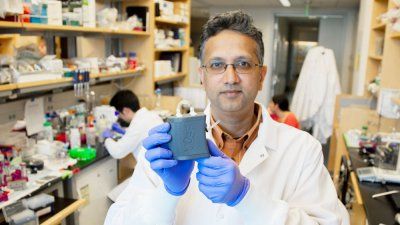How an Approach Called ‘Shock and Kill’ Could Cure HIV
HIV can lurk for a lifetime in the body, so to truly cure patients, scientists are trying to find ways to target these HIV reservoirs in a strategy known as “shock and kill.”

University of California San Francisco
Give to UCSFHIV can lurk for a lifetime in the body, so to truly cure patients, scientists are trying to find ways to target these HIV reservoirs in a strategy known as “shock and kill.”

In a bid to end the worst epidemic in modern times, the Foundation for AIDS Research (amfAR) is funding an ambitious effort based in San Francisco to eliminate the human immunodeficiency virus (HIV) from those who are infected.

The Malaria Elimination Group, an independent international advisory group on malaria elimination convened by the Global Health Group at the University of California, San Francisco (UCSF), gathered in the Ezulwini Valley for its tenth meeting to celebrate Swaziland’s achievements. The meeting was opened on November 16, 2015 by Swaziland’s Minister of Health, Honorable Sibongile Ndlela-Simelane.

In the first U.S. safety trial of a new form of immunotherapy for type 1 diabetes, patients experienced no serious adverse reactions after receiving infusions of as many as 2.6 billion cells that had been specially selected to protect the body’s ability to produce insulin.

A new study led by UCSF researchers has found that mice who spend too much time in their thermal “comfort zone” while gorging on fatty foods more than double their risk of developing cardiovascular disease compared to mice who stayed cool while eating the same diet.

It is worthwhile to give patients expensive new drugs that can cure their hepatitis C much earlier than some insurers are now willing to pay for them, according to a UCSF study.

UCSF researchers has discovered that single-celled yeast have sensory biases that can be hacked by a carefully engineered illusion, a finding that could be used to develop new approaches to fighting diseases such as cancer.

One in 20 survivors of gunshot violence in an urban area with high crime died within five years, mainly by homicide, according to the results of a study that tracked patients after hospital discharge.

A study that tracked tens of thousands of midlife and older men for more than 20 years has found that vigorous exercise and other healthy lifestyle habits may cut their chances of developing a lethal type of prostate cancer by up to 68 percent.

UCSF researchers have found a human gene that could one day allow physicians to correct congenital deformities, regrow damaged fingers, or even mend a broken heart.

A wave of specialized immune cells entering the skin in early life may induce tolerance to the hundreds of species of so-called friendly bacteria that live on the surface of the body.

A $10 million gift from The Parker Foundation, founded by Silicon Valley entrepreneur and philanthropist Sean Parker, will establish a new research laboratory within the UCSF Diabetes Center devoted to understanding autoimmunity.

The trajectory of Bruce Miller’s work is emblematic of the integration seen within the entire neurosciences field over the last decade, as its broad range of disciplines attract unprecedented levels of investment.

The Atlantic Philanthropies is awarding UCSF and Trinity College Dublin, the University of Dublin, $177 million to create the Global Brain Health Institute, a groundbreaking venture to stem the precipitous rise in dementia by training and connecting a new generation of leaders worldwide.

An international team of scientists led by UCSF researchers has mapped out the genetic trajectories taken by melanoma as it evolves from early skin lesions, known as precursors, to malignant skin cancer.

Although adults with serious psychiatric disorders are at high risk for diabetes, a large study led by UCSF reveals that low-income patients on Medicaid are rarely screened for it.

Scientists at the UNC School of Medicine (UNC) and UCSF have created a general tool to probe the activity of orphan receptors, illuminating their roles in behavior and making them accessible for drug discovery.

In a new look at the groundbreaking iPrEx trial for people at high risk of HIV infection, UCSF researchers have identified strong evidence of efficacy for transgender women when PrEP is used consistently.

A chemical that could potentially be used in eye drops to reverse cataracts has been identified by a team of scientists from UCSF, the University of Michigan (U-M), and Washington University in St. Louis (WUSTL).

A gift of $20 million from the Ray and Dagmar Dolby Family Fund to the Department of Psychiatry at UCSF will support research on mood disorders.

Development of a surgically implantable, artificial kidney has received a $6 million boost, thanks to a new grant from the National Institute of Biomedical Imaging and Bioengineering (NIBIB).

To determine whether healthy food could help low-income people better control their diabetes, a pilot study by UCSF and Feeding America tracked nearly 700 people at food banks in California, Texas and Ohio over two years.

A research team led by UCSF scientists has identified a molecular switch capable of converting unhealthy white fat into healthy, energy-burning brown fat in mice.

Reducing consumption of added sugar has the power to reverse a cluster of chronic metabolic diseases, high cholesterol and blood pressure, in children in as little as 10 days, according to a study by researchers at UCSF and Touro University California.

UCSF Sandler Fellow Joseph Bondy-Denomy studies the native roles of CRISPR and anti-CRISPR proteins in bacteria and phages.

Genetic ancestry, as well as facial characteristics, may play an important part in who we select as mates, according to an analysis from UCSF, Microsoft Research, Harvard, UC Berkeley and Tel Aviv University.

Health care providers must have detailed discussions with their older adult patients to better determine their true life expectancy, according to researchers at UCSF and San Francisco Veterans Affairs Medical Center.

UCSF has launched a collaboration with international pharmaceutical company GlaxoSmithKline plc (GSK) to promote early-stage research with the potential to translate into new therapies for cancer, obesity and antibiotic resistant bacteria.

To help stop the spread of antibiotic resistance, UCSF scientists are urging hospitals around the country to stop buying meat from animals that were given antibiotics for growth promotion.
